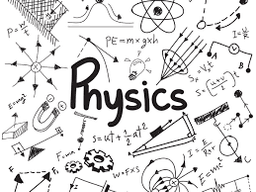
PART 1: Midterm Examination in Fundamentals of Physics
Quiz by Mark Paulo San Juan
Feel free to use or edit a copy
includes Teacher and Student dashboards
Measure skillsfrom any curriculum
Tag the questions with any skills you have. Your dashboard will track each student's mastery of each skill.
- edit the questions
- save a copy for later
- start a class game
- automatically assign follow-up activities based on students’ scores
- assign as homework
- share a link with colleagues
- print as a bubble sheet
- Q1
A truck moves 70 m east, then moves 120 m west, and finally moves east again a distance of 90 m. If east is chosen as the positive direction, what is the truck's resultant displacement?
-280 m
40 m
280 m
-40 m
30s - Q2
In one-dimensional motion, the average speed of an object that moves from one place to another and then back to its original place has which of the following properties?
It is negative.
It can be positive, negative or zero.
It is positive.
It is zero.
30s - Q3
An object moves 20 m east in 30 s and then returns to its starting point taking an additional 50 s. If west is chosen as the positive direction, what is the average speed of the object?
0.73 m/s
-0.50 m/s
0.50 m/s
0 m/s
60s - Q4
A bird, accelerating from rest at a constant rate, experiences a displacement of 28 m in 11 s. What is the average velocity?
2.50 m/s
1.70 m/s
0 m/s
3.40 m/s
60s - Q5
A student throws a ball straight up. For which situation is the vertical velocity zero?
on the way back down
on the way up
at the top
in the beginning
30s - Q6
A railroad train travels forward along a straight track at 80.0 m/s for 1 000 m and then travels at 50.0 m/s for the next 1 000 m. What is the average velocity?
65.00 m/s
63.7 m/s
70.0 m/s
61.50 m/s
120s - Q7
On a position versus time graph, the slope of the straight line joining two points on the plotted curve that are separated in time by the interval delta t, is which of the following quantities?
instantaneous velocity
average acceleration
instantaneous acceleration
average velocity
30s - Q8
A European sports car dealer claims that his car will accelerate at a constant rate from rest to 100 km/hr in 8.00 s. If so, what is the acceleration? (Hint: First convert speed to m/s.)
3.47 m/s2
17.4 m/s2
6.82 m/s2
11.4 m/s2
300s - Q9
A v vs. t graph is drawn for a ball moving in one direction. The graph starts at the origin and at t = 5 s the acceleration of the ball is zero. We know that at t = 5 s,
the slope of the curve is non-zero
the velocity of the ball is not changing
the curve is at v = 0 and t = 0
the curve is not crossing the time axis
30s - Q10
The value of an object's acceleration may be characterized in equivalent words by which of the following?
velocity
rate of change in position
displacement
rate of change in velocity
20s - Q11
An object is dropped from a height. Once it is moving, which of the following statements is true, at least at one point?
its velocity is never equal to its acceleration
its velocity is more than its acceleration
its velocity is the same as its acceleration
its velocity is less than its acceleration
20s - Q12
The slope of the acceleration vs. time curve represents:
the rate of change in position
the rate of change in velocity
the rate of change in acceleration
the velocity
20s - Q13
A ball is pushed with an initial velocity of 4.0 m/s. The ball rolls down a hill with a constant acceleration of 1.6 m/s2. The ball reaches the bottom of the hill in 8.0 s. What is the ball's velocity at the bottom of the hill?
17 m/s
10 m/s
12 m/s
16 m/s
120s - Q14
A cart is given an initial velocity of 5.0 m/s and experiences a constant acceleration of 2.0 m/s2. What is the magnitude of the cart's displacement during the first 6.0 s of its motion?
66 m
55 m
10 m
80 m
120s - Q15
A vehicle designed to operate on a drag strip accelerates from zero to 30 m/s while undergoing a straight line path displacement of 45 m. What is the vehicle's acceleration if its value may be assumed to be constant?
15 m/s2
10 m/s2
2.0 m/s2
5.0 m/s2
120s